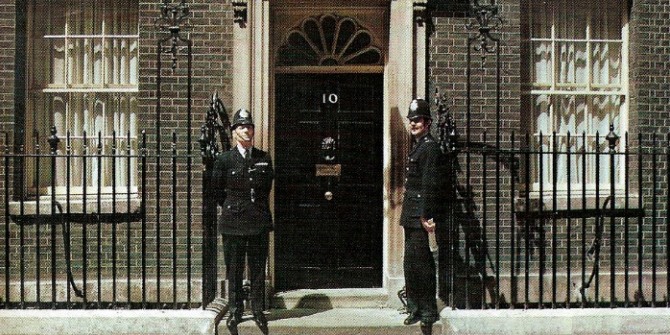
 John Major has been a successful former Prime Minister, still making impactful interventions over issues such as the Scottish independence referendum and Brexit. This is unlike other former prime ministers. Drawing on their latest book, Kevin Hickson and Ben Williams explain why we need to reconsider his premiership.
John Major has been a successful former Prime Minister, still making impactful interventions over issues such as the Scottish independence referendum and Brexit. This is unlike other former prime ministers. Drawing on their latest book, Kevin Hickson and Ben Williams explain why we need to reconsider his premiership.
John Major was Prime Minister for six and a half years, one of the longest-serving Premiers in post-war Britain. However, his tenure always looked fragile. In a way he was fated to serve as Prime Minister in this way because of the nature of his inheritance. However, in a recent book which we edited, John Major: An Unsuccessful Prime Minister? a theme which emerged is that Major deserves more credit than he is usually given.
This is not to say that his premiership was a total success, politics does not happen like that. As Enoch Powell commented all political careers, unless somehow cut off midstream, end in failure. For Major ultimate and inevitable failure came in 1997 with the long-delayed General Election resulting in his party going down to one of their worst ever electoral defeats at the hands of New Labour, and remaining in opposition until 2010.
 Credit: Wikimedia Commons, CC BY 2.0
Credit: Wikimedia Commons, CC BY 2.0
For his immediate predecessor, the inevitable failure came not at the hands of the voters but rather her own Party, and especially Cabinet colleagues. Fearful of electoral annihilation with Margaret Thatcher still at the helm, and increasingly concerned with her belligerence over European integration and association with unpopular policies such as the Community Charge (or Poll Tax), in late 1990 the Cabinet visited her one by one to tell her she would lose the second ballot in the Tory leadership contest.
With Thatcher gone, the aim of her supporters was to stop the assassin from becoming the victor, and so Major emerged as the ‘stop Heseltine’ candidate. Little was known about Major. He had first been elected to the Commons in 1979, was appointed to Cabinet in 1987, and this had led to brief spells as Chancellor of the Exchequer and Foreign Secretary. He was considered personable and charming if a little dull and quiet, which some perhaps unfairly depicted as being ‘grey’. He often gave the impression of someone who appeared to be in agreement with whoever he was talking to, which Thatcher interpreted as him being a fellow traveller.
That image was soon shattered when Major appeared much less an ideologue and much more a party unifier who sought a degree of ‘consensus’, perhaps an inevitable role after the divisive Thatcher leadership. This was reflected in him appointing Michael Heseltine to the Cabinet, while making speeches saying he intended Britain to be at the ‘heart of Europe’.
It was Europe that was to be the divisive issue of his premiership. One of the few concrete achievements in his short time at the Treasury was to enter Britain into the European Exchange Rate Mechanism (ERM) – a precursor to membership of the single currency. From the start the currency markets believed that the pound was overvalued and in September 1992 on so-called ‘Black Wednesday’, the pound was forced out of the ERM. The Chancellor, Norman Lamont, was seen rushing around looking and sounding stressed and interest rates were increased sharply to try to avoid ERM exit. However, Lamont later claimed that it should have been called ‘Golden Wednesday’ and was said to have been heard singing in his bath.
Towards the end of 1991 EEC member states signed the Maastricht Treaty, which contained several steps of a markedly integrationist nature including moves towards a single currency. The Treaty required ratification by each member state. Major had negotiated opt outs from the single currency and Social Chapter. He believed that this would be sufficient to win over doubters in his increasingly fractured party. But, with Labour and the Liberal Democrats pushing for adoption of the social policy dimension, a significant number of his own MPs adopted a much more determined Eurosceptic line, encouraged by the now ennobled Lady Thatcher and her trusted supporter Lord Tebbit. Throughout 1992 and 1993 the ratification process dragged on.
Had Major had the sort of parliamentary majority which Thatcher enjoyed throughout her premiership such rebellions would not have mattered, but in 1992 his majority had been reduced to 21, and it fell further due to deaths, defections, and by-elections. The 1992 victory was in fact impressive and partly down to Major’s personal campaigning style. Labour under Neil Kinnock had modernised and the opinion polls predicted a Labour win, but a number of Labour campaign gaffes, underlying public suspicion of its economic competence, fears of tax increases under a Labour administration, and the possible effects of a right-wing media, arguably tipped the balance. Facing apparent electoral defeat Major took to his ‘soap box’ and his apparently antiquated campaign techniques contrasted starkly and favourably with Labour’s much more ‘presidential’ campaign. It was the first and so far only time in the democratic era that a party had won four elections in a row.
However, by that September public opinion had turned with Black Wednesday, and although the economy steadily recovered the Conservatives had lost their reputation for economic competence and Labour led in the opinion polls consistently from then on. The failure of Britain’s involvement in the ERM emboldened the Eurosceptics in their opposition to Maastricht. Eventually Major encouraged his critics to ‘put up or shut up’ and John Redwood resigned from the Cabinet to challenge for the leadership in 1995. Although Major won comfortably, the fact that he was challenged at all showed his weakness. He never recovered and stood down immediately on losing the 1997 election in order to watch the cricket.
Other things further exposed Major’s weakness. His ill-fated ‘back to basics’ campaign – implying a more moralistic approach to politics – became a source of derision when his government became plagued by scandals of both a sexual and financial nature.
Despite all of this, on most objective criteria his government was a success. Despite the internal divisions he did keep his Party together. There was the impressive fourth election victory in 1992, and he revived the party’s social agenda. The economy grew continuously, and he bequeathed one of the best economic legacies to his successors.
A number of contributors to the volume who knew or know Major personally, including his political opponents at the time, point to him being a thoroughly decent person in politics. Of course, politics is a brutal sport and to succeed in it one has to be tough. While he may well have had a ruthless streak in private, in public he was generally charming and pleasant. He has been a successful former Prime Minister, making relatively infrequent interventions in politics but ones which have an impact, notably over issues such as devolution and Brexit. This may sound like a backhanded compliment but others such as Heath, Thatcher, and Blair have – for different reasons – not been successful former Prime Ministers and their stock declined whereas Major’s has increased. For this also he requires praise.
______
Note: John Major: An Unsuccessful Prime Minister? was published earlier in 2017 by Biteback.
 Kevin Hickson is Senior Lecturer in British Politics at the University of Liverpool.
Kevin Hickson is Senior Lecturer in British Politics at the University of Liverpool.
 Ben Williams is Tutor in Politics at the University of Salford.
Ben Williams is Tutor in Politics at the University of Salford.
All articles posted on this blog give the views of the author(s), and not the position of LSE British Politics and Policy, nor of the London School of Economics and Political Science.







